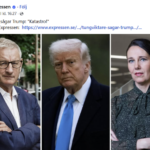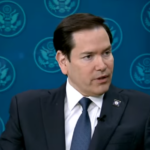Éric Zemmour (pictured), one of the only journalists in France who still speaks freely… is brought into court at least once a year. The fines imposed on him come to 10,000 euros ($11,800) each time. (Photo by Lionel Bonaventure/AFP via Getty Images)
November 1, 2020. Didier Lemaire, a high school teacher who works in Trappes, a small town west of Paris, published an open letter in the left-wing magazine Le Nouvel Observateur. He spoke of the murder of Samuel Paty, another teacher, savagely beheaded two weeks earlier by a Muslim extremist. He denounced the submission of the French authorities to religious intimidation and the impossibility of the French school system being able to transmit any real knowledge of history or to give students the intellectual means to think freely. He said that in just a few years, the situation in the city where he worked has deteriorated markedly. Lemaire wrote:
”The year I arrived in the high school where I teach, the city’s synagogue had just been burned down and Jewish families forced to leave. After the 2015 and 2016 attacks in France, I got involved in preventive actions…. In 2018, seeing that my efforts collided with forces much more powerful than me, I wrote to the President of the Republic to ask him to act urgently to protect our students from the ideological and social pressure exerted on them, a pressure which gradually withdraws them from the national community. Unfortunately, no action was taken….
”There are currently 400 radicalized people with a S file [dangerous to the security of the state] who roam freely in Trappes…. Thousands of ideologues are at work… fostering a feeling of victimhood [in order] to incite hatred. These ideologues are by no means ’separatists’: they do not simply want to remove people from the national community, they want to destroy the Republic, democracy and the school system…. Their strategy is to avoid a frontal war, and to multiply acts of terror to exhaust the enemy…. They neutralize danger awareness by using the bad conscience of ”progressives”, and by speaking of ’racism’, ’injustice’ or ’police violence’…. They want to reduce women to slavery. They infiltrate schools, universities, the local and national political sphere, by spreading everywhere…the injunction to ’accept the difference of the other’. They paralyze the will to respond to killings other than with flowers, candles and words…
”We are at the beginning of a war of terror that will amplify because a large part of our fellow citizens prefer not to see that it is our heritage that is threatened. If they were willing to see what is happening, they would have to fight with courage. Samuel Paty had this courage. No doubt, because he cherished our heritage. But he was not protected by the institutions, which underestimated the threat, just as our political representatives and the majority of our citizens do.”
Although the letter received no reaction from the French authorities, Lemaire, right after its publication, received death threats. He was also aggressively questioned by people on the street who told him that he would suffer the same fate as Paty. While the Ministry of the Interior placed him under police protection, he was harshly criticized by the administrative division: they accused him of creating unrest. ”He is irresponsible,” they said. ”He throws oil on the fire”. The other teachers at the high school where he taught accused him of attracting attention, thereby endangering them. The city’s mayor, Ali Rabeh, a member of a far-left party, Génération.s, accused him of sullying the city, and filed a defamation suit against him. Lemaire chose to resign.
Many teachers in France face the same situation. Even though some dare to talk about it, they ask, when speaking to journalists, to remain anonymous. They are doubtless scared — a mindset that beheadings are presumably meant to create. There are also teachers who, possibly because they are scared, choose to bow their heads, give up teaching certain subjects and — when students shout anti-Semitic and anti-Western insults — to act as if they hear nothing. It has become almost impossible in most French high schools to talk about either Israel or the Holocaust.
Most journalists seem to prefer avoiding all discussion of the advance of radical Islam in France. They know that those who do so are immediately called ”racists” or ”Islamophobes” and are often threatened, prosecuted, sentenced to heavy fines or fired from their place of work.
Political leaders, both left and right, perhaps out of a willful blindness or a concern for votes, avoid the subject as well.
Éric Zemmour, one of the only journalists who still speaks freely about the problem, is brought into court at least once a year. The fines imposed on him come to 10,000 euros ($11,800) each time. Despite multiple calls to fire him, the television channel CNews admirably continues to give him a daily platform. A few weeks ago, the CSA (Superior Audiovisual Council), the institution in charge of the regulation and supervision of audiovisual media in France, finedCNews 200,000 euros ($238,000). When, for instance, a man initially named as Ali H., 18, and enjoying the status of ”unaccompanied child refugee” — who turned out to be 25, and named Zaheer Hassan Mehmood — attacked two people with a cleaver in front the former offices of the satirical magazine Charlie Hebdo, Zemmour said:
”Every year, France welcomes on its soil without control thousands of people from the Muslim world supposed to be isolated minor refugees who are neither minors nor isolated, and who often commit robberies and murders”.
Even though what Zemmour related was accurate and verifiable, the CSA saidthat to state certain facts constitutes ”incitement to racial hatred”.
Only one political party dares to speak clearly of the dangers arising from the Islamization of France and radical Islam: National Rally. Its president, Marine Le Pen, is also often summoned by judges and condemned. In 2015, a French journalist compared National Rally to the Islamic State. Le Pen responded by posting on Twitter two photographs of crimes committed by the Islamic State and added, ”This is Islamic State”. On February 10, 2021, Le Pen had to appear before a tribunal to respond to a complaint lodged against her by the French Ministry of Justice for ”dissemination of violent messages seriously undermining human dignity, likely to be seen by a minor”. In court, the judge asked Le Pen in an accusatory tone, ”Do you consider that these photos violate human dignity?” Le Pen replied, ”It is the crime that violates human dignity, it is not its photographic reproduction”.
France is the main Muslim country in Europe (officially, 8.8% of its population is Muslim). Islam is the second religion in France, but come in first if one counts the number of active practitioners. Churches are most often empty and the number of congregants is dwindling (since 2000, 45 churches in France have been razed to the ground). Mosques, however, are full and more numerous. The number of Muslims who want to practice Islam is so large that in several cities, every Friday afternoon Muslims pray in the streets and block traffic during prayer time, while the police dare not intervene.
France is also a country where more than 150 mosques spread across the country host imams who deliver extremely radical sermons and call for action against the West. The number of young Muslims under 25 who place Islamic law above French law continues to grow and has now reached 74%. During the last decade, Islamists who have committed deadly attacks in France were mostly Muslims born in France. This was true of Mohammed Merah, who murdered soldiers as well as Jewish children in Toulouse in 2012; Said and Cherif Kouachi, who murdered twelve people at the magazine Charlie Hebdo in 2015; Amedy Coulibaly, who murdered people at a supermarket in Saint Mande, a few days after the attack on Charlie Hebdo, and Samy Amimour, one of the three terrorists who murdered 90 people in November 2015 in the Bataclan Theater. That makes radical Islam and Islamic terrorism a French problem.
A large majority, 61%, of the French population are aware that a serious and growing problem faces French society, and consider Islam to be incompatible with French values.
Zemmour’s daily televised program, despite the fines, has been breaking all audience records for more than a year. When the magazine Valeurs Actuellespublished a poll conducted to see how many people would vote for Zemmour if he decided to be a candidate in the next French presidential election, he was projected to receive 17% of the vote.
Polls indicate that Le Pen, who is officially a candidate, would receive more than 26% of the votes and be in first place after the first round of the 2022 presidential election — ahead of France’s current President Emmanuel Macron. In the second round, Macron was projected to win, but by a small margin. Among the French President’s entourage, concerns are growing. In 2017, Macron used fear of ”fascism” to push the French not to vote for Le Pen, but various surveys show that this strategy may no longer work.
Before the coronavirus pandemic, many in France had rejected Macron. He had made contemptuous remarks regarding the underprivileged. He had violently crushed the uprising of the ”yellow vests”. A long public transport strike had blocked the country just before the French government decreed a strict lockdown, completely paralyzing the country’s economy for several weeks. For months, a curfew, from 7pm to 6 am, was imposed on the entire French population. More than a year after the start of the pandemic, a strict lockdown was decreed again. Since March 17, 2020, more than a year ago, any gathering of more than six people has been banned. Cafes, restaurants and most shops remain completely shut. The economic consequences have been catastrophic: in 2020, France’s economy contracted by more than 8%, one of the worst in Europe.
The public’s frustration with Macron remains high: 60% of the French say they are dissatisfied or very dissatisfied with how he is managing the country.
For months, Macron has sought a way out. He can see that Le Pen’s success stems from the firm positions she has taken in the face of Islamic danger. He decided to act. Having spoken several times about the creation of an ”Islam of France”, last year, he announced that he would target what he called ”Islamist separatism”. He seemed to mean that more and more French Muslims respect only Islamic laws and live in neighborhoods that non-Muslims have abandoned, therefore now areas subject to Islamic rules. On October 2, 2020, he said that a law would soon be passed to remedy the problem.
Macron and the French government were quickly confronted by various leaders in the Muslim world who boycotted French products. Anti-France rallies were organized in Turkey, and effigies of Macron were burned. France’s minister of foreign affairs, Jean-Yves Le Drian, was immediately dispatched to Egypt to meet with the grand imam of al-Azhar University, Ahmed al-Tayyeb, and in November said publicly that ”France has a deep respect for Islam”.
Those drafting the new law were asked to be extremely careful. In December 2020, a first draft of the text was presented to the French parliament. French Muslim organizations and anti-racist movements declared the text ”Islamophobic”. Since then, the law has been almost entirely rewritten and emptied of substance.
The expression ”Islamic separatism”, which seemed ambiguous anyhow, disappeared from the text. All mention of Islam and ”Islamism” disappeared, as well. Many Islamists, as documented by the sociologist Bernard Rougier in his recent book, Les territoires conquis de l’islamisme (”The Territories Conquered by Islamism”) — and those with whom he spoke, who were open about their goals — seemed not to want to ”separate”, but rather to take over more territory and regulate more of the non-Muslim population.
The word ”secularism” (laïcité), which originally appeared in the proposed law, has also been withdrawn. Instead, the new version reads, a ”law confirming the principles of the Republic”. In other words, the new law affirms principlesalready affirmed in existing laws: government services must be religiously neutral, and polygamy and forced marriages in France are prohibited. The new law promises sanctions against hate speech on social media, although a lawpassed six months ago already promised that. The new law also bans home schooling — practiced by few Muslims, but by many Christians.
As soon as the law was passed, Zemmour stated that Macron had given up fighting radical Islam, and that the law was ”designed not to upset or threaten anyone, not to identify the adversary and not to say that Islam poses a problem because it is both a religion and a legal and political project”. The law, Zemmour added in Le Figaro, does not ”face reality”.
”This,” Le Pen remarked, ”is a totally ineffective law which undermines the freedom of all parents to choose the education provided to their children, and which shows that the government is incapable of attacking those who fight the French Republic”.
Along with the presentation of the law, Frédérique Vidal, the French Secretary of Higher Education, asked for an inquiry on the ”Islamo-leftism” in French universities. Her remarks drew fierce criticism and led to a petition signed by six hundred university professors accusing her of using ”extreme right vocabulary” and ”defaming an entire profession”. Macron supported the petition and affirmed his ”absolute attachment to the independence of professors and researchers”. Vidal protested that she simply wanted to do a ”review of all the research taking place in the country”. The debate over the support that multiple leftist organizations are giving to radical Islam — and the growing presence of this support within French universities — ended before it began.
After the beheading of Paty, only one moque was closed: the Great Mosque of Pantin, in the northern suburbs of Paris. Its shutdown lasted just three months. In addition, one radical Islamic association was dissolved: Baraka City. There are, however, many other radical Islamic associations in France and they remain untouched. The main Muslim organization in France continues to be ”Muslims of France” (formerly the Union of Islamic Organizations of France), which is the French branch of the Muslim Brotherhood. Muslims of France operates the only school in France that trains imams: the ”European Institute of Human Sciences”, in Saint Leger-de-Fougeret, a small village in Burgundy.
In Strasbourg, a Turkish organization, Millî Görüş (”National Outlook”) — an organization close to Turkey’s ruling AKP Party and to Turkish President Recep Tayyip Erdogan — is building what will be the largest mosque in Europe. The Strasbourg city council has granted 2.5 million euros ($2.94 million dollars) toward the work (the total cost will amount to 32 million euros, $37.6 million). In January 2021, the French Council of Muslim Worship (CFCM), an institution created in 1989 to represent the French Muslims, asked the nine organizations of which it is that made up, to sign a ”charter of the Islam of France”. The charter would say that ”no religious conviction can be invoked to shirk civic obligations”. Four organizations, including Millî Görüş, refused to sign it. The Union of Islamic Organizations of France had left the French Council of Muslim Worship several years ago and therefore did not sign the charter, either.
Interior Minister Gerald Darmanin said that the construction of the mosque in Strasbourg constituted ”foreign interference” in France and that although he was opposed to the decision of the city of Strasbourg to finance it, he had no legal means to prevent decision or the construction. He did not criticize Millî Görüş. On January 26, 2021, he more firmly announced banning an association — Génération Identitaire (”Generation Identity”) — that is fighting by peaceful means the advance of radical Islam in France. Darmann claimed that the association was ”undermining the republic.”
A year ago, Bruno Retailleau, a member of the French Senate, had already warned that the rapidly growing number of Islamists within a rapidly growing Muslim population means that France is ”losing the fight against Islamism. Soon,” he cautioned, ”it will be too late”.
The columnist Ivan Rioufol wrote:
”The fault of Generation Identity, denouncing, through non-violent actions, the rise of Islamism in France as well as uncontrolled immigration… The criminalization of dissenting thought is a something that should not have its place in an advanced democracy. Rare are those who protest against the wall of silence which prohibits calmly discussing issues related to Islam and immigration. By deciding to ban Generation Identity, Darmanin wants to silence dissonant voices by accusing them of racism. The weapon is all the more intellectually dishonest that the minister of the interior says that political Islam is a real danger.”
On March 22, the newspaper Le Monde published an editorial saying that the question of Islam will likely be at the center of the 2022 presidential election, and that Le Pen has a good chance of winning:
”Fourteen months before the presidential deadline of 2022, … the supposition is that … Marine Le Pen, will necessarily be in the second round of the election and that whoever will face her is no longer guaranteed to win”.
Dr. Guy Millière, a professor at the University of Paris, is the author of 27 books on France and Europe.





